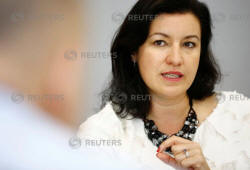Germany needs crisis mentality to close digital gap:
Merkel ally
 Send a link to a friend
Send a link to a friend
 [November 13, 2018]
By Paul Carrel and Douglas Busvine [November 13, 2018]
By Paul Carrel and Douglas Busvine
BERLIN/FRANKFURT (Reuters) - Germany's
thriving economy has lulled the country into a false sense of security
that is hindering government efforts to close a digital technology gap
with other leading economies, Chancellor Angela Merkel's digital czar
said on Tuesday.
Merkel's cabinet is holding a retreat on Wednesday and Thursday, after
which it wants to present an artificial intelligence (AI) strategy to
help Europe's biggest economy adjust to the digital era.
Germany has been at the forefront of industrial innovation for decades,
but policymakers have been late to realize that its export model, based
on traditional manufacturing, is vulnerable, and it is struggling to
catch up.
Solid growth - the economy is in its ninth year of expansion - has left
many businesses too busy meeting orders today to have time to plan for a
digital future.

"Unlike other countries, a majority here do not feel that there needs to
be great change," Dorothee Baer, Merkel's Minister of State for Digital
Affairs, told a business conference hosted by the Sueddeutsche Zeitung.
Invoking a need to act induced by the global financial crisis a decade
ago, she added: "I'm not saying 'unfortunately we don't have a crisis',
but rather 'unfortunately the need to change things is not
there'."Merkel has made fixing Germany's digital deficiencies a priority
for her fourth and almost certainly final term, saying the country's
future prosperity depends on it.
Sketching out the government's AI strategy, Merkel's chief of staff said
last week the plan would focus on how to gather more data, support
research, retain skilled workers and encourage them to found start-ups.
Extensive surveillance, first by the Nazis and then by Communist East
Germany's Stasi secret police, has led to Germans closely guarding their
privacy and personal data.
Merkel believes it is time to move forward, but the chancellor faces an
uphill struggle.
Inadequate investment, a skills deficit and lack of digital innovation
are problems in Germany, people in the sector say.
[to top of second column] |

Dorothee Baer, German Minister of State for Digitalization, attends
a Reuters interview in Berlin, Germany, June 7, 2018.
REUTERS/Hannibal Hanschke

"We don't have an ecosystem in Germany where these people want to go and build,
and find the next 10 people with talent like that," said Gabriel Matuschka,
general partner at Fly Ventures, a Berlin-based seed-stage investment fund.
DEVELOPING NATION
Lars Klingbeil, a senior member of Merkel's Social Democrat coalition partners,
said Germany must commit billions of euros to back its AI strategy or risk
falling further behind the United States and China.
But Baer complained there were always other pressures to spend Germany's budget
surplus.
"It is always easier to say 'we have sparkling tax revenues, we could also dole
some out'," she said.
Germany, hampered by an outdated research infrastructure and restrictive data
protection laws, has yet to produce a world-beating start-up that pioneers the
use of AI, although 120 companies have formed a lobby group to further the
process.
The group's head, Joerg Bienert, said it was important that policy makers had
recognized the scale of the challenge but to tackle it they needed to back AI
research with heavy investment.
"I fear that we won’t make a big enough leap,” he told Reuters.

Chris Boos, the founder of AI company Arago who sits on a panel that advises
Merkel on hi-tech issues, said Germany must get to grips with digital technology
or risk slipping into a steep post-industrial decline.
"The price of inaction is that you will be a developing nation in 10 years,"
Boos said.
(Writing by Paul Carrel, editing by Ed Osmond)
[© 2018 Thomson Reuters. All rights
reserved.] Copyright 2018 Reuters. All rights reserved. This material may not be published,
broadcast, rewritten or redistributed.
Thompson Reuters is solely responsible for this content. |